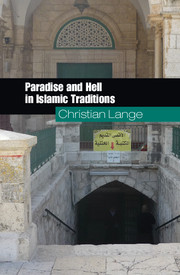Book contents
- Frontmatter
- Dedication
- Contents
- List of Figures
- List of Table and Charts
- Acknowledgements
- List of Abbreviations
- Note on Dates, Citation, Translations, and Transliteration
- Introduction
- Part I Textual Foundations: Narrating the Otherworld
- Part II Discourses and Practices: Debating the Otherworld
- 5 The Otherworld Contested: Cosmology, Soteriology, and Ontology in Sunni Theology and Philosophy
- 6 Otherworlds Apart: Shiʿi Visions of Paradise and Hell
- 7 The Otherworld Within: Paradise and Hell in Islamic Mysticism
- 8 Eschatology Now: Paradise and Hell in Muslim Topography, Architecture, and Ritual
- Epilogue
- Primary Sources
- Secondary Sources
- Index of Names
- Index of Terms
8 - Eschatology Now: Paradise and Hell in Muslim Topography, Architecture, and Ritual
from Part II - Discourses and Practices: Debating the Otherworld
Published online by Cambridge University Press: 05 December 2015
- Frontmatter
- Dedication
- Contents
- List of Figures
- List of Table and Charts
- Acknowledgements
- List of Abbreviations
- Note on Dates, Citation, Translations, and Transliteration
- Introduction
- Part I Textual Foundations: Narrating the Otherworld
- Part II Discourses and Practices: Debating the Otherworld
- 5 The Otherworld Contested: Cosmology, Soteriology, and Ontology in Sunni Theology and Philosophy
- 6 Otherworlds Apart: Shiʿi Visions of Paradise and Hell
- 7 The Otherworld Within: Paradise and Hell in Islamic Mysticism
- 8 Eschatology Now: Paradise and Hell in Muslim Topography, Architecture, and Ritual
- Epilogue
- Primary Sources
- Secondary Sources
- Index of Names
- Index of Terms
Summary
In the preceding chapters of this book much of our attention has been occupied by textual spadework. The dearth of previous scholarship devoted to the Muslim literature on paradise and hell invited this approach, in fact it necessitated it. Now that we have laid some textual foundations, we shall examine how the literary representations of paradise and hell translated into tangible spatial and material phenomena. As I argue in this chapter, paradise and hell were world-making ideas in the history of Islamic civilisation not just in the sense of giving rise to abstract cosmological, theological, or mystical systems of thought. Rather, in certain contexts, they provided a concrete blueprint for the interpretation of this-worldly realities and for the organisation of Muslim society on earth. This chapter highlights three areas in which the Muslim discourse on paradise and hell became operative in this way: topography, architecture, and ritual. An analysis of these three fields of cultural production brings to light an eschatological worldview, by which I mean the conceptual framework in which otherworldly phenomena are made to be present in this world in a regularised and sustained fashion in order to provide everyday life with layers of ultimate meaning. In this framework, paradise and hell are not distant repositories of truth and justice but immediate targets to which present concerns are addressed. Furthermore, as I argue in this chapter, the mode in which paradise and hell are made to be present in this world is not referential. It is not that certain worldly spaces, objects, and rituals symbolise, refer to, or gesture towards an otherworld that is absent, although they may often do this, too. Rather, what emerges from the sources understudy here is the sense that these phenomena are truly and fully here on earth. They claim to be the thing itself, not signs of it. They indicate presence, not likeness.
Eutopia/Dystopia
“The entire world is a place for us to worship (juʿilat la-nā al-arḍ kulluhu masjidan),” the Prophet is reported to have said. In this view, the world as a whole is sanctified in the sense that it gives access to the divine. It is clear, at the same time, that certain spaces, such as mosques, cities, and sacred landscapes enjoy a privileged status, while others, such as bathhouses and marketplaces, are devalued and declared unfit for ritual.
- Type
- Chapter
- Information
- Paradise and Hell in Islamic Traditions , pp. 245 - 278Publisher: Cambridge University PressPrint publication year: 2015



